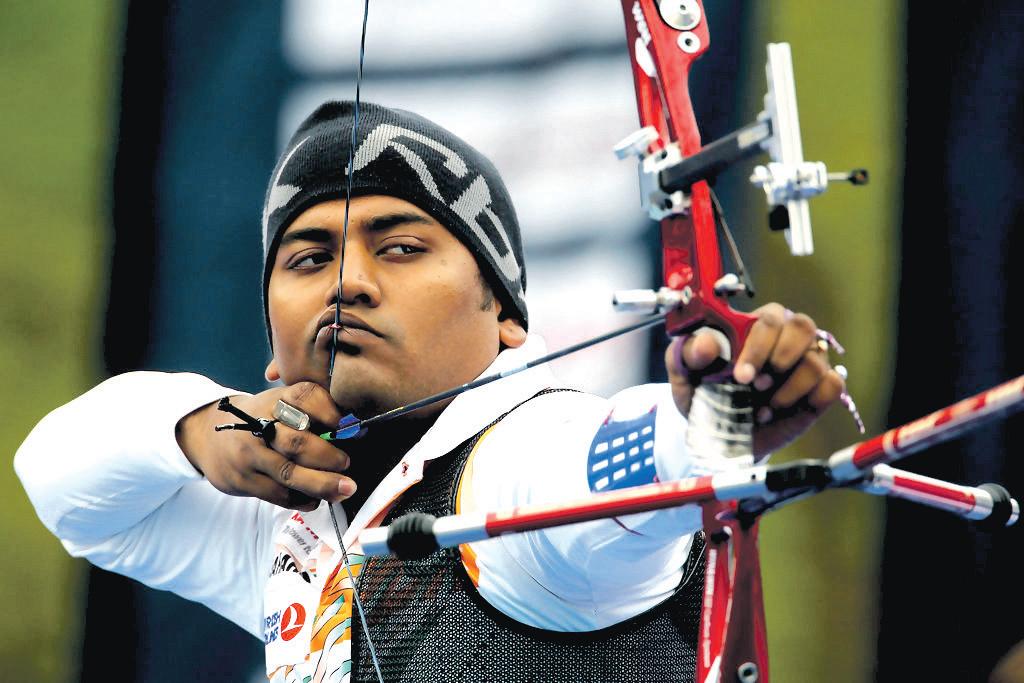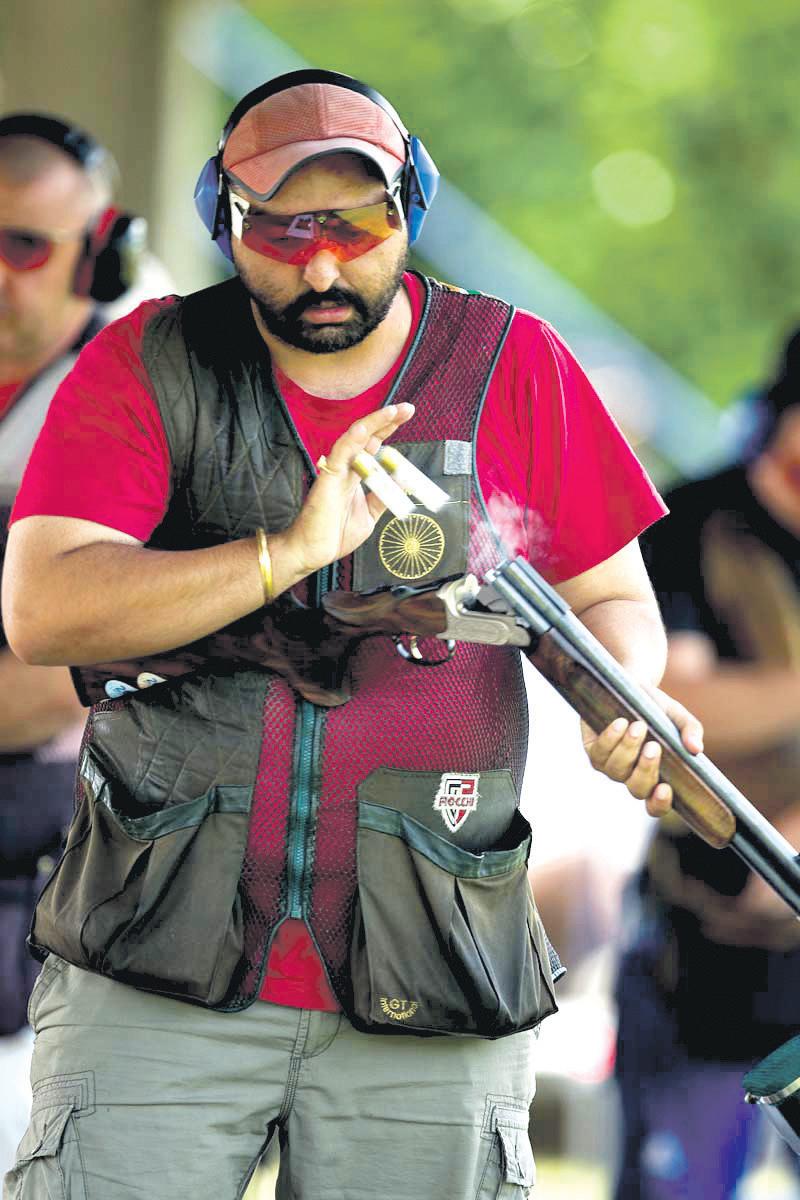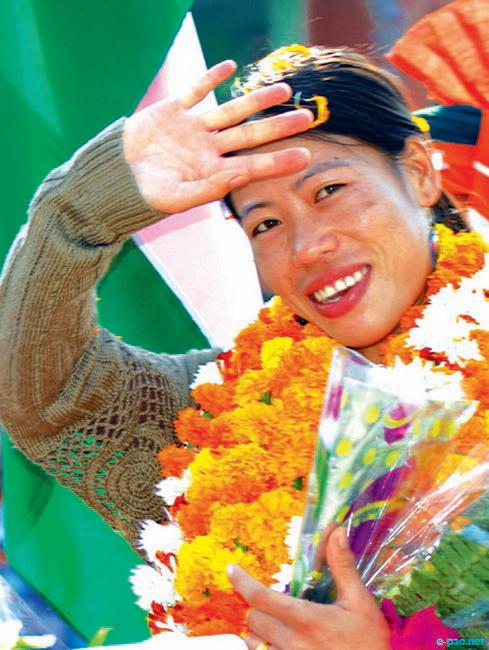
11 minute read
London 2012 HoW WILL IndIA FARE?
from 2012-07 Sydney (2)
by Indian Link
The hopes of over a billion Indians rest on a handful of its athletes at the 2012 Olympic Games
BY RITAM MITRA
Excitement has been building up steadily for the 2012 Olympics, which will begin in London on July 27, making London the first city to officially host the modern Summer Olympics three times. There will be over 200 countries participating, featuring an estimated 10,500 athletes. Although India has been a perennial under-achiever at the Games, Beijing in 2008 was India’s best ever performance, and this year’s team, India’s largest-ever contingent with 85 athletes, have high expectations upon them.
The Opening Ceremony itself will have a small Indian element in it – and it isn’t because of the promise of a village cricket team which will form a part of a huge set of rural Britain, featuring chickens, sheep, as well, in a typically British self-deprecating style of humour, a real cloud which will actually rain. Although most Indians (and Australians for that matter) will relate to the rare presence, albeit superficially so, of cricket at the Olympics, they will be more excited to hear AR Rahman tracks in part of a medley showcasing Indian influence in the
UK. Danny Boyle who directed Slumdog Millionaire is the artistic director of the opening ceremony in London, and requested that Rahman compose pieces for the medley.
History of wins
India has so far, won 20 medals in total at the Summer Olympics, from 22 appearances. Unfortunately, this comes to almost 60 million heads per medal. As a rough comparison, Australia’s 432 medals in 26 appearances gives a ratio of 1 medal per 50,000.
For India, the golden years were between 1928-1956, when they won six successive gold medals in field hockey. Indeed, of the 20 medals India has won, 11 have come purely from field hockey. However, in Beijing 2008, for the first time in eight decades, India failed to qualify for the event.
Even so, in Beijing, for only the second time in its long history at the Games, India won more than one medal (the last time being Helsinki 1952), and for the first time ever, won more than two. India also found its firstever individual gold medallist in Abhinav Bindra, who won the 10m Air Rifle event.
The events
India will be led by chef-demission Ajit Pal Singh, the dual-bronze medallist field hockey player and triple
Olympian between 1968-1976, and will compete in 13 sports, encompassing 54 events. Perhaps the most likely medallists will come from the 11 shooters, the five wrestlers and eight boxers –however, the Badminton coach is confident of a strong showing, and India is sending a record eight tennis players, including bronze medallist from the 1996 singles event, Leander Paes.
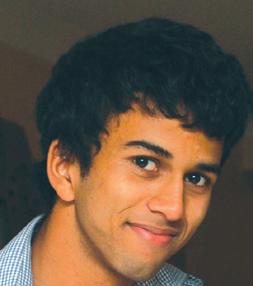
Shooting
Abhinav Bindra will be looking to defend his gold medal, while Heena Sidhu and Annu Raj Singh will hope to continue their recent good form. Rifleman Gagan Narang and shotgun expert Ronjan Singh Sodhi are also hoping to be amongst the medals. Sodhi is the first Indian to have ever defended a world title, and although he failed to make the cut for Beijing, he has tasted plenty of success on the world stage. Having won two World Cups, he also won gold at the 2010 Asian Games and scored a silver at his home Commonwealth Games in the same year.
As a result of his achievements to date, Sodhi is naturally relaxed ahead of the Games. “I don’t want to give the Olympics too much of importance so that I stay focused. The competition is the same and the competitors are all those who have been participating in various international tournaments with me. We know one another very well, so it is nothing new or anything I don’t know about,” says Sodhi. “If I win a medal, it will be great. Even if I don’t, I will still be happy as long as I give my best shot. I know if I do my best, I will get a medal”.

Wrestling
For one of India’s big wrestling hopes, Yogeshwar Dutt, however, pressure is definitely an issue. Dutt narrowly missed out on a medal in Beijing, and is in a period of intense training to make sure he is fit for the extremely physical bouts.
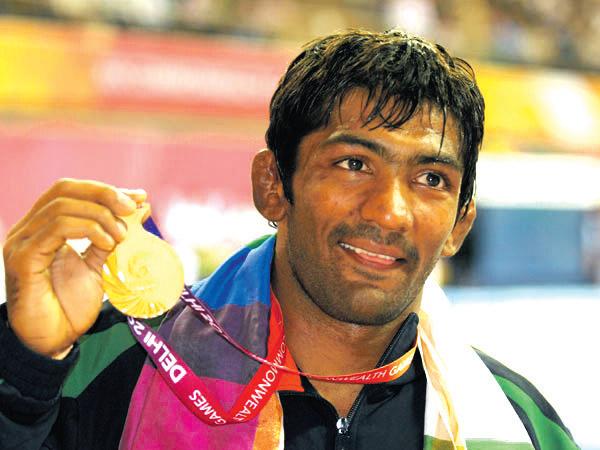
“I won’t say there is no pressure,” says Dutt. In fact, there is immense pressure on all the wrestlers, but then we can perform better when there is pressure. I feel the pressure acts more as inspiration. To be honest, when we step on the mat, pressure vanishes”.
Like Sodhi, Dutt has also been a big name on the world circuit, having claimed gold at the 2010 Commonwealth Games as well as the 2012 Asian Championships.
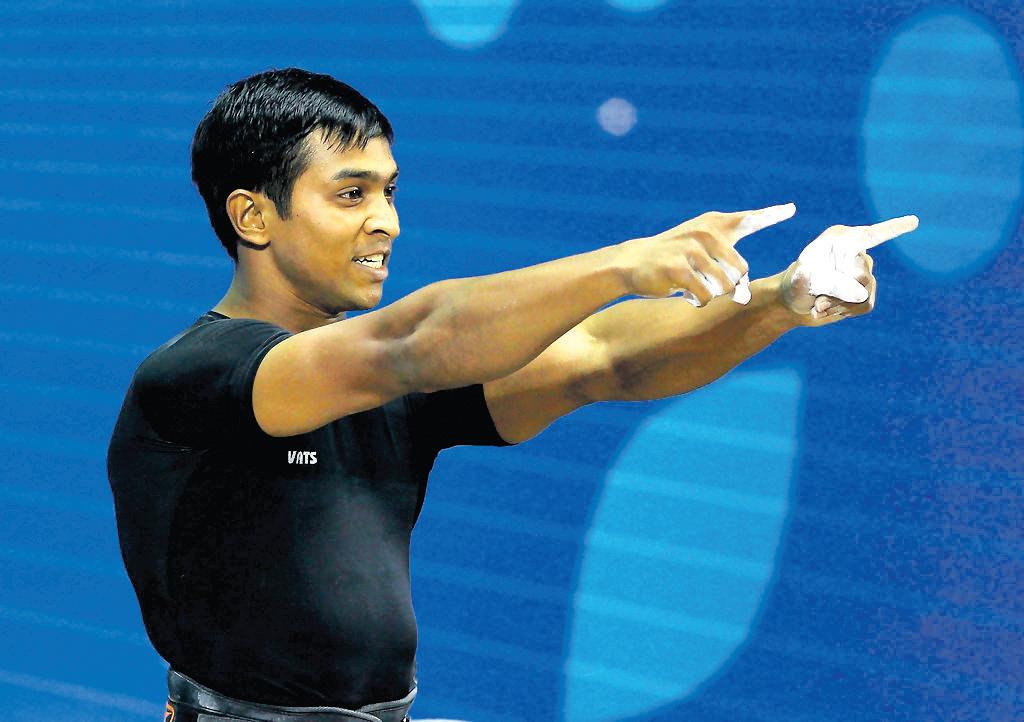

Meanwhile, Sushil Kumar, the Beijing bronze medallist, feels that wrestling has evolved greatly in the last decade, and it has forced him, as well as his team, to make changes to their styles.
“Every wrestler has to change his style and technique regularly,” says Kumar. “It helps to keep the opponent guessing. Change was badly needed. My opponents are watching my videos everyday and they can easily analyse my fighting technique. It is important to change style regularly. It was a tactical decision and I hope it will work at the Olympics”.
Tennis
India’s tennis team has been marred by serious controversy over their doubles pairings. Both Rohan Bopanna and Mahesh Bhupathi refused to partner Leander Paes, who was forced to unite instead with little-known youngster Vishnu Vardhan, and in a compromise, Paes was entered into Mixed Doubles with Sania Mirza.
The bitter row has resulted in a strain on relationships between all of the players, and is at best, an extremely poor showing by the senior men, who many youngsters look up to. Although the men’s attitudes leave much to be desired, perhaps India’s best hope at a medal here will be Mirza and Paes in the Mixed Doubles – Mirza won the French Open title with Mahesh Bhupathi, while Paes recently came off second-best in the Wimbledon final, in his partnership with Russian Elena Vesnina. Without Mirza putting a rational foot forward, it would not be surprising if the men embarrassed themselves even further. “The controversy did not do anything good to anybody. It created bad blood among us and that is very unfortunate. I am happy that it is over and I can now concentrate on doing well at the Olympics with Leander and winning a medal,” says Mirza.
Boxing
In boxing, India have their third returning medallist from Beijing – along with Bindra and Kumar, Vijender Singh, the middleweight bronze medallist and subsequent world number one, joins 6 other men and two women in a quest for Olympic glory.
Vijender became the first Indian boxer to qualify for the Olympic Games for a third successive time after beating Chuluuntumur
Tumurkhuyag of Mongolia 27-17.
“It obviously feels good, but I just don’t want to be tagged as the one who played three Olympics, but as the one who got medals in two,” says Vijender, whose first Olympic medal changed the boxing scene in the country.
Vikas Krishan, Devendro Singh and 18-year-old Shiva Thapa are the expert picks for India’s best medal hopes, but perhaps the greatest fairytale story would be five-time world champion, and mother-oftwo, MC Mary Kom, hitting the podium, as women’s boxing is introduced into the Olympics for the first time.
Kom switched from light flyweight to flyweight purely to qualify for the Olympics, and has had a remarkable career so far –an Olympic medal for the 39-yearold would be icing on the cake.
Archery
India’s performance in archery at the Delhi Commonwealth Games surprised many, and has since unearthed some good talent, even a world number one in Deepika Kumari.
Though highly hopeful of winning an Olympic medal, Deepika says being at the top of the rankings does not guarantee a podium finish at the London Games.
“Being world number one is added pressure,” says Deepika.
“It does not guarantee a medal unless I and all the team members perform well. However, our preparation has been good and we hope to make the country proud”.
The women’s team has Deepika, Laishram Bombayla Devi and Chekrovolu Swuro and the men’s team Rahul Banerjee, Jayanta Talukdar and Tarundeep Rai.
Deepika exudes confidence of winning medals both in the individual and team event.
“Why expect a medal only from me,” she observes. “Our team is good enough to get medals. We have been practicing real hard and are quite satisfied with our preparations”.
Chekrovolu says that the camaraderie and teamwork between the three girls is the strength of the team.
“We understand each other well and help each other on the field,” says the 29-year-old from Nagaland. “We do not hesitate to point out each other’s mistakes. The chemistry and understanding between the three is our strength”. With Bombayla Devi being the only one with Olympic experience, the team will bank on her.
“Though I was nervous in my first Olympic (Beijing 2008), this time I am confident. We are well prepared and confident both individually and as a team,” the 27-year-old from Manipur says.
Badminton
Five shuttlers will be carrying India’s hopes in London, and to everyone it is clear that the main challenge will be China’s dominance in the sport. However, India’s chief badminton coach, Pullela Gopichand, is more than optimistic about the team’s prospects in London.
“We have a fairly good chance of winning a medal in the women’s doubles,” says Gopichand. “Jwala (Gutta) and Ashwini (Ponnappa) are looking good. They are a formidable combination. I would say I am very optimistic that we have a medal in women’s doubles event and mixed doubles. In both these events we have strong representation and we expect to win a medal”.
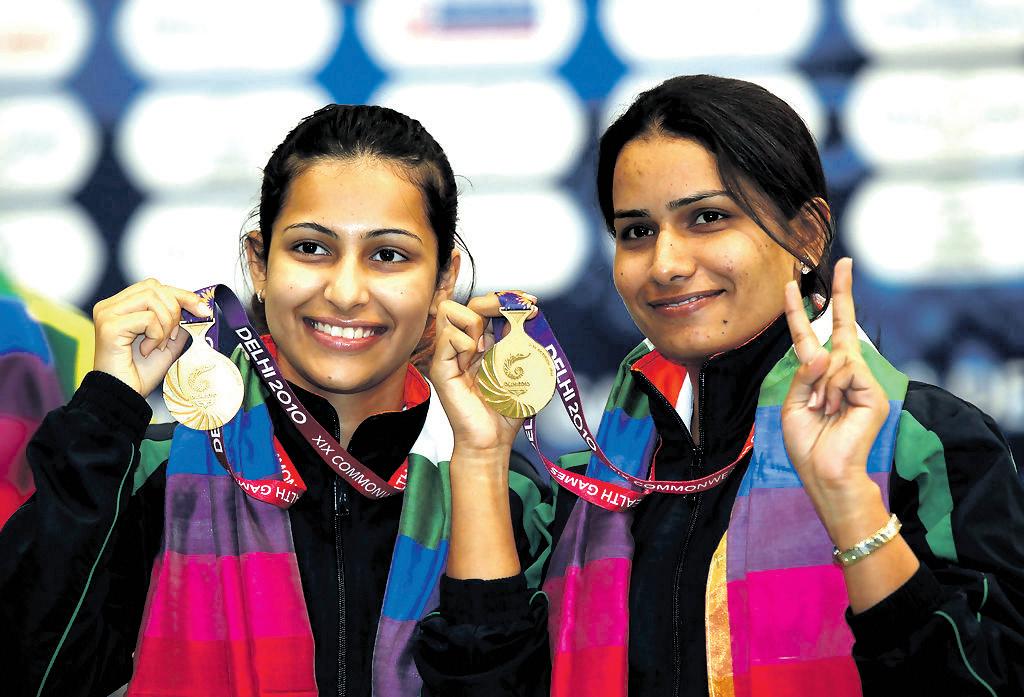
Ashwini Ponnappa, a 24-yearold girl from Bangalore, has already experienced a similar atmosphere to the one which she will be exposed to at the end of the month. “We had the World

Championship in the same arena (Wembley) where we are going to have the Olympics badminton event. We got the bronze last time. I hope it will be a better medal this time,” she says.
This is Jwala Gutta’s first Olympics. “I don’t think I have anything to lose at the Olympics, everything to gain. I am going to go there and give it my best shot,” the spunky girl says.
The glamorous shuttler (she was on the cover of a fashion magazine sporting a short dress and sky-high heels recently), also realises the enormous responsibility she has on her shoulders, but at the same time she feels honoured to be taking part in two Olympic events. She will be playing the women’s doubles with Ashwini and mixed doubles with V. Diju.
But all eyes will be on the iconic badminton star Saina Nehwal.
Four years ago when she played at the Beijing Olympics she was but 18 - and she became the first Indian to enter the badminton quarterfinals at the Olympics. Now she is heading for London with confidence, experience and with several titles in the runup to boot. She has emerged a clear threat to the badminton superpowers.
Those who have followed the Hyderabadi’s badminton from close quarters insist the 22-year-old is India’s best bet for a medal in London. Coach Syed
Danny Boyle who directed Slumdog Millionaire is the artistic director of the opening ceremony in London, and requested that Rahman compose pieces for the medley.
Clockwise: Deepika Kumari, Archery
Ravi Kumar Katulu, Weightlifting
Yogeshwar Dutt, Wrestling

Saina Nehwal, Badminton

Annu Raj Singh and Heena Sidhu, Shooting
Jwala Gutta, Badminton

Abhinav Bindra, Shooting
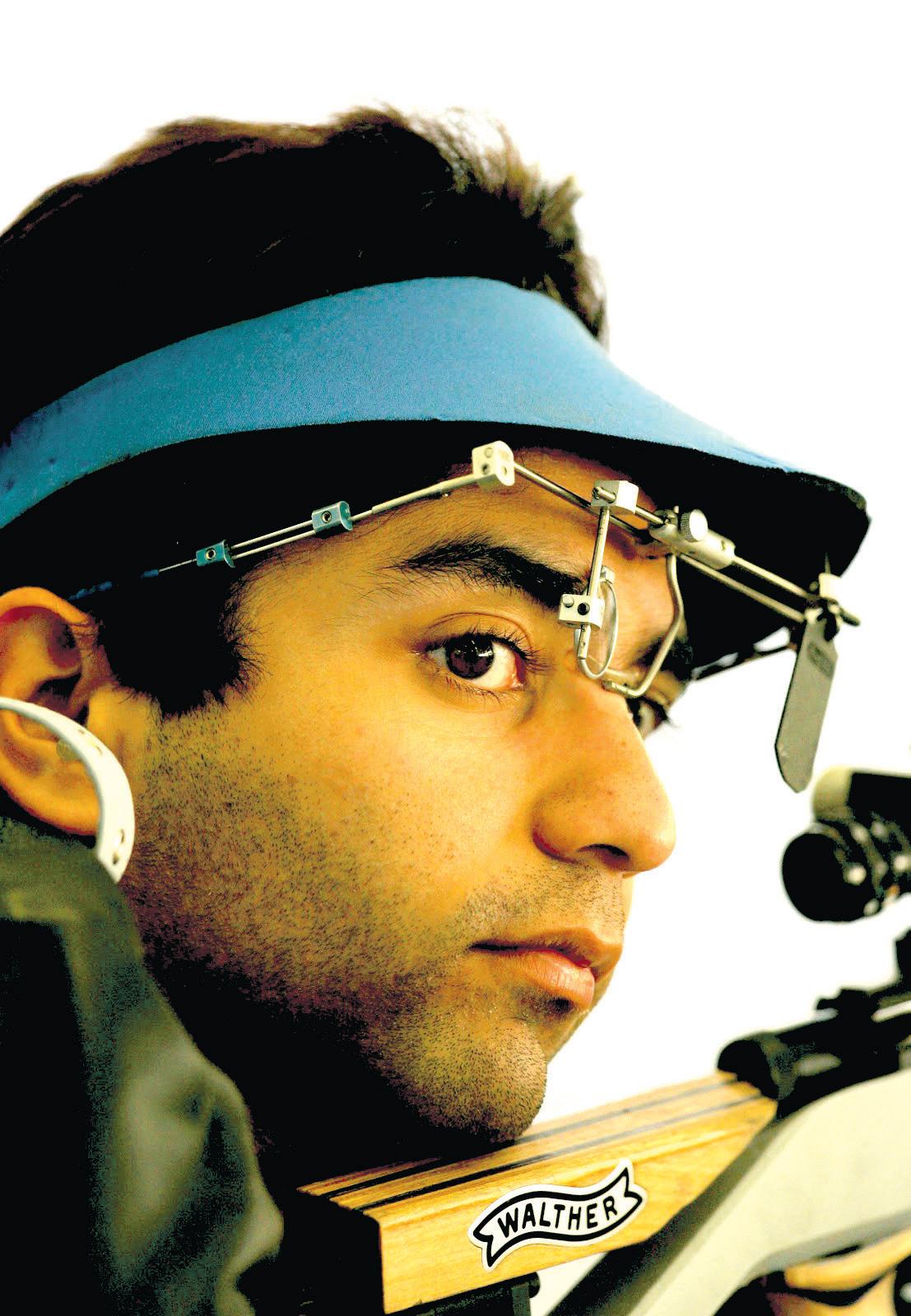
Ashwini Ponappa, Badminton
With a few medal contenders in several sports, this could be the year India finally proves that cricket is not the nation’s only interest.
Saina have risen after her splendid showing on the circuit in recent months. After bagging the Thailand Open and Indonesia Super Series titles last month, the world number four stood up to the domination of the Chinese girls and proved they can be beaten.
Saina has defeated all top players of the world except current No.1 Wang Yihan, one of the three Chinese who will be in action in the women’s singles at the London Olympics. But the other player who has harassed her is third-ranked Li Xuerui. Should China prefer to field Asian champion and third-placed Li Xuerui ahead of the second ranked Wang Xin or fourthplaced Wang Shixian, it will add to Saina’s worries.
But it is the measured Saina who has the last word.

“I can only hope and try,” she says, “not predict!”
India will also be competing in athletics, table tennis, field hockey, swimming, rowing, judo and weightlifting – and there is every chance that we could well have our best haul yet. With a few medal contenders in several sports, this could be the year India finally proves that cricket is not the nation’s only interest. As Vishwanathan Anand did with chess earlier this year, who will step up for India and make themselves and their sport a household name?
B LAST FROM THE PAST Some of India’s top Olympic moments
Melbourne 1956 The last of India’s hockey sides in the famous 28year long stretch of India’s field hockey dominance at the Games, the 1956 side was said to be the greatest to have ever left India’s shores. India hammered Afghanistan 14-0, the United States 160, and Singapore 6-0. Having lost their captain Balbir Singh to a fractured finger in the opening game, India’s Udham Singh scored 7 goals against the US, two against Singapore, and the only goal in India’s stunning win over Germany in the semi-final. Randhir Singh Gentle scored the solitary goal in the final against none other than Pakistan, and India went home having not conceded a single goal in the entire tournament – which they had done in 1928 as well. Just as quietly, India had beaten the USA 24-1 in the 1932 final in Los Angeles.
Khashaba Jadhav, also known as the ‘Pocket Dynamo’, was independent India’s first individual Olympic medallist, and won the freestyle wrestling bronze medal in Helsinki. What made his journey even more remarkable was the fact that the principal of the local Kolhapur Rajaram College, Mr Khardekar, mortgaged his house to support Jadhav financially, while local shopkeepers provided him with groceries to help him meet ends. Jadhav’s medal was India’s only individual medal until Leander Paes won bronze in 1996.
Sydney 2000 Karnam Malleswari became the first Indian woman to win an Olympic medal, taking out the bronze in the clean and jerk weightlifting event. Prior to this, Malleswari had already received the Rajiv Gandhi Khel Ratna award, India’s highest sporting honour in 1995-96, as well as the Padma Shri in 1999. Malleswari’s medal saved India the blushes of going without a single medal at an Olympics for the fifth time in 6 Games.
While it’s great to remember the heroes of the past, India has also had its fair share of athletes who just missed out on immortalisation. Here are three heartbreaking moments that adorn the annals of India’s Olympics history.
Rome 1960 Milkha Singh clocked up a world record 45.8 seconds at the preliminary races in France – yet, thanks to a photo finish, fell just out of medal contention at the Games in Rome. Singh was so devastated, he cried for weeks and stated that it was his worst ever memory – second only to his parents’ death.
Los Angeles 1984 PT Usha, the Kerala-born hurdler, came first in the 400m semi final and she looked set to make history for India on the track. In the final, Usha started confidently and quickly, only for a restart to be called. On the second run of the race, Usha missed out on the bronze medal by literally one-hundredth of a second, in another photo finish.
London 1948 Henry Rebello, a triple-jumper, was only 19 years old when he stunned the field, surging through to the final of the event and seemed certain of at least a medal. However, his youthfulness proved to be a double-edged sword – Rebello, who refused to warm up prior to jumping, did his hamstring on the second part of the jump – the ‘skip’, and was carried off the field in a stretcher, in yet another case of ‘so close yet so far’.
S USHIL K UMAR NAMED FLAG - BEARER
Sushil Kumar, bronze winning wrestler from the Beijing Olympics, will be India’s flag-bearer at the London Games’ opening ceremony July 27.

Leander Paes (tennis), Abhinav Bindra (shooting) and Vijender Singh (boxing), were also in the reckoning for the flagbearer’s role.
“Paes has already been given the honour, while Bindra and Vijender have their competition in the early days of the Olympics,” Indian Olympic Association (IOA) acting president Vijay Kumar Malhotra said.
Atlanta bronze medallist Paes was the flag-bearer at the Sydney Games in 2000. Trap shooter Rajyavardhan Singh Rathore carried the national flag in the Beijing edition four years ago.
